Dog Law review slows; SkateGarden rules set
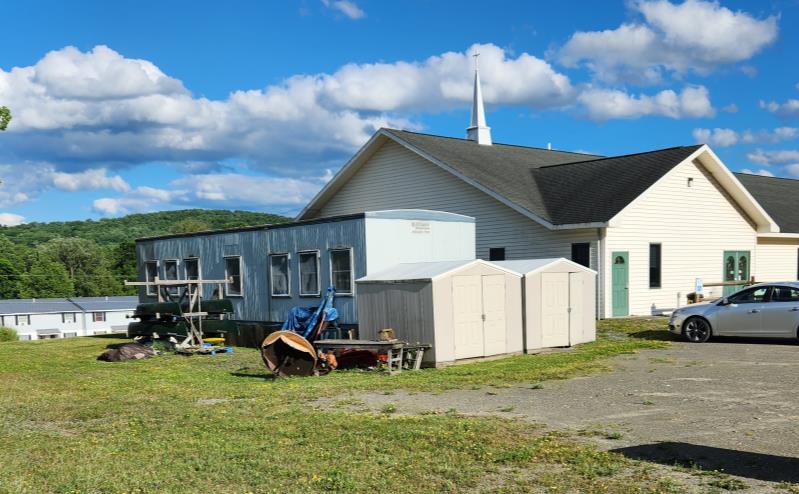
by Robert Lynch; August 15, 2024
When the Tompkins County Legislature first parceled out its $6.5 Million Community Recovery Fund in December 2022, the Town of Enfield and its hometown agencies got nothing. When the Legislature held a second round of awards in May of last year, the Town itself got $26,592—four-tenths of one per cent of the total—to buy new radios for its Highway Department. Meanwhile, the Enfield Community Council (ECC) and the Enfield Volunteer Fire Company (EVFC), despite standing comfortably in the queue, got frozen out—again.
But in that same process, as has been well-reported, Cayuga Medical Center (CMC) won the largest award of all, $1.5 Million, 23 per cent of the funding pot, to help build a Crisis Stabilization Center in the Shops at Ithaca Mall.
In the past year, things haven’t much changed. But for CMC, that’s a problem. Despite repeated attempts, the hospital corporation has found itself unable to dislodge Albany regulators from their reluctance to give the Crisis Center the approvals it needs. Tompkins County legislators in late-June gave CMC until the end of this month to secure Albany’s OK or else forfeit the Recovery Fund grant.
That’s where the Enfield Town Board stepped in Wednesday night.
In a two-page, 14-paragraph Resolution that took longer to read than to discuss or vote on, the Town Board urged the County Legislature to re-open the Community Recovery Fund’s application process to 21 select applicants, including both the ECC and the EVFC, should the hospital fail to meet its August 30th deadline, a failure most officials expect.
“Enfield Community Council sought $146,000 for a mental health wing on its Enfield Community Center,” this Councilperson, Robert Lynch, told the Tompkins County Legislature August 6th. Lynch responded to committee talk that legislators might, instead, redirect the CMC money for County purposes. This writer insisted that the ECC investment would be “very compatible” with what CMC has proposed, yet cannot persuade regulators to approve.
“I think that what we should do is not take that $1.5 Million, which is a quarter of the Community Recovery Fund, and put it back into this big, dark hole called the General Fund,” I told the Legislature that night. “I think we should open it up to applicants like ECC and see if we can do good things with it for the community, that the community will be proud that we did.”
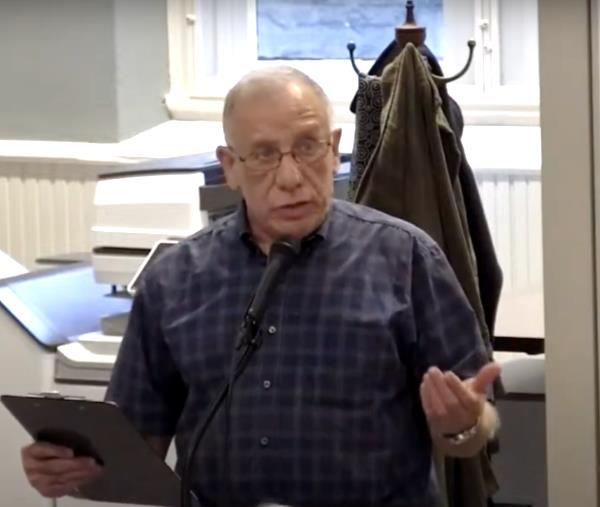
Faced with tight contracting requirements for the Recovery Fund, deadlines imposed by the federal government because the $6.5 Million total is drawn from Tompkins County’s award under the American Rescue Plan (ARPA), legislators in committee August 5th got jittery. They feared that if they opened up a new round of reviews, recipients might not meet the deadlines, and the federal money would be lost.
“The contingency plan is that we’re going to use it (that is, the $1.5 Million) for County purposes, probably highway equipment or something expensive and easily justified with ARPA money,” Dan Klein, Chair of both the Legislature and the Community Recovery Fund Advisory Committee, said in answering committee member Veronica Pillar’s question as to what contingency the committee had made for redistributing the CMC money.
Pillar replied that clawing back the money to the General Fund would be “uncool” and that the optics to the community would be “not great.”
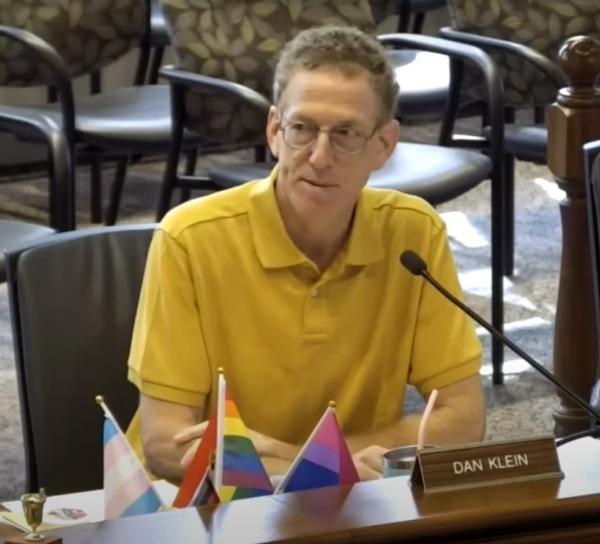
But at the early-August meeting, Klein also held out the prospect that his recommended contingency plan could be revisited “if anybody has a different idea.” Should CMC come up dry on August 30th, the full Legislature would likely determine as a group how to reassign the surplus cash.
“[T]he removal of nearly one-quarter (23%) of the original CRF allocation through redirecting its resources to County purposes would severely weaken the program’s beneficial community impact and run contrary to the program’s original intent and its stated promise to Tompkins County residents,” the Enfield Town Board’s adopted Resolution stated.
The Town Board approved the Resolution unanimously and routinely without debate. The Resolution directed the Town Clerk to notify the Tompkins County Legislature of Enfield’s position.
Anne Koreman, one of Enfield’s two Tompkins County legislators, attended the Town Board meeting Wednesday. She left before the Resolution was adopted. Advised before she left that the matter would receive Board attention, Koreman declined a commitment on whether she’d support or oppose it. However, Koreman did point to the late-December contracting deadline, one which she may have misunderstood as a deadline for actual project completion.
Koreman also remarked that recent Tompkins County sales tax distributions have slumped, implying that the Recovery Fund moneys might prove needed for general government purposes.
“[B]oth the Enfield Volunteer Fire Company and the Enfield Community Council stand ready, willing and able to utilize CRF funds and comply with appropriate government deadlines,” Wednesday’s Town Board Resolution stated assuredly.
ECC President Cortney Bailey has said in the past that should her application receive Recovery Fund approval, an existing trailer standing on the site of the mental health wing could be demolished within 48 hours, and the new building promptly put in its place.
****
In other Enfield Town Board business:
Dog Law Revisions: In contrast to the sharp words and graphic descriptions of its last meeting two weeks earlier, the Town Board Wednesday took a second, more methodical and less adversarial look at its draft 16-page Dog Control and Licensing Law, one that would replace a simpler, three-page document now on Enfield’s books.
Because of newly-learned legal and contractual complexities, Town Board members concluded that what had started out as a relatively simple adjustment of dog licensing fees last April has morphed into a much larger undertaking, one that may not lead to a Public Hearing or a final vote until November.
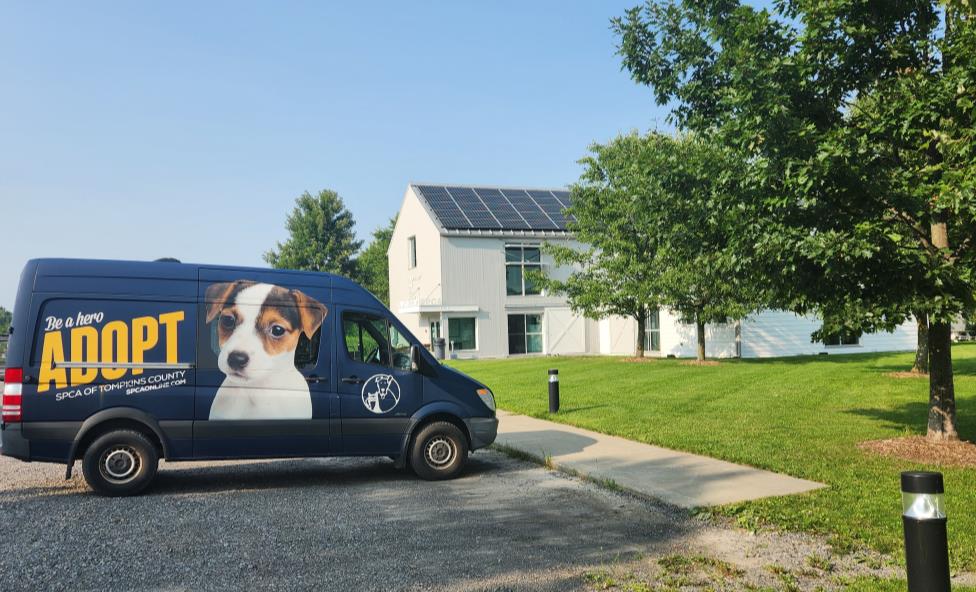
In its latest, nearly hour-long review, the Board brushed past the earlier, testy issue of whether an owner should be held liable for a dog killing an intruding pet on the dog owner’s own property. Instead, ironically, talk turned to protecting the lives of dogs seized and impounded after they’d become lost or run unlicensed, and whether the draft law’s current language—as well as that of Enfield’s dog control contract with the Tompkins County SPCA—provides sufficient protection against euthanasia.
“All seized and unredeemed dogs pursuant to [state law] will be humanely destroyed (in accordance with the procedures described in the law) or make (sic) them available for adoption through the SPCA of Tompkins County,” Enfield’s current, three-year contract with the SPCA states.
Led by this Councilperson, the Town Board questioned whether the contract’s current phrasing puts the SPCA’s priorities backward: that adoption should become the agency’s first objective; euthanasia only a last resort.
“Our SPCA is currently a no-kill shelter,” Councilperson Lynch, reminded colleagues. “That does not mean it will always stay that way.”
The Town of Enfield now pays the SPCA $16,737 annually for dog control. The contract, negotiated jointly with six other municipalities, will expire in December. Terms call for an intermunicipal Advisory Board to negotiate a new contract by the end of this September. But Town Clerk Mary Cornell cautioned that the Advisory Board has not met for a while. In fact, no one at Wednesday’s meeting knew who represents Enfield on that Board.
And because of the Enfield Board’s concern about dog impoundment and possible euthanasia, this year’s negotiations could prove more important than they usually do.
Enfield’s draft Dog Law, presumably based on a New York Agriculture and Markets statute—its terms also presumably embodied within the SPCA contract—would allow only five days for an “unidentified” dog to be impounded before the SPCA could either adopt it out or kill it. The impoundment period would only be two days longer for a dog that carries clear identification but remains unclaimed.
Town Board members voiced consensus that residents and their dogs would benefit from a longer impoundment period. But the change might run into conflict with state law and also require the SPCA to charge Enfield more money.
Enfield SkateGarden: Continuing a home-grown process very much made up as it goes along, Town officials Wednesday learned more—and took action—as Enfield SkateGarden visionary and overseer Daniel Woodring and his army of volunteers construct the Town-owned and County-funded Enfield skateboarding park across from the Town Hall.
Remarking that the Town and promoters are very much “flying by the seat of their pants,” this Councilperson, Lynch, offered, and the Town Board unanimously adopted, a nine-point list of “general rules” SkateGarden’s umbrella nonprofit group must follow as a “precondition” for their holding the weekly benefit concerts planned at the park.
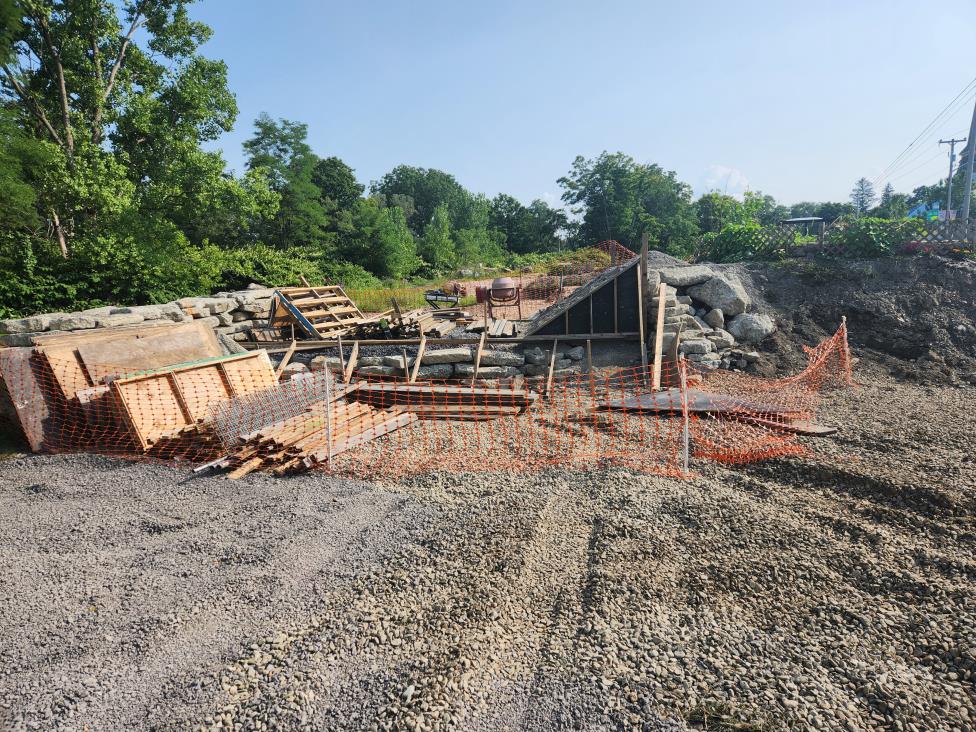
In addition to insurance requirements previously imposed, Woodring and his volunteer partners must provide sufficient portable restroom facilities, control traffic and event parking, ban alcohol consumption on premises consistent with Town policy, and provide illumination should autumn concerts extend after dark.
As for the park’s actual construction, Woodring funneled word to the Board through Deputy Supervisor Greg Hutnik that the park’s most critical component, the “half-pipe” bowl, is set for pouring September 14th. Woodring will use Sakrete and reinforcement rods purchased from Lowe’s and a cement mixer he bought himself. Commercially mixed concrete, Hutnik explained, would cost too much and might not work with the ramp’s odd shape.
Town Supervisor Stephanie Redmond, Town Clerk Mary Cornell, and Hutnik found themselves tangled into knots Wednesday deciding how Woodring could buy the needed materials, purchase them on the Town’s behalf, and still get a municipal sales tax exemption. As with anything labeled “SkateGarden,” nothing has proven simple.
Woodring—again, through Hutnik—advised the Board that the SkateGarden’s first Band Series concert is set for Thursday, August 29th; assuming, of course, that Woodring follows through on a Town requirement to purchase event insurance.
Redmond advised the Board that the coverage Woodring’s non-profit has said it will buy satisfies Enfield’s own insurance carrier. It would provide the Town $1 Million of liability protection. As of Wednesday’s meeting, Woodring had not yet documented to Redmond his organization’s actual purchase of the policy. Hutnik explained that the Tompkins County Parks Grant underwrites SkateGarden’s construction, but cannot also pay for the insurance.
The Benefit Band Series’ initial act was revealed at the meeting. An online event poster announces SkateGarden’s first performer as “Drew Kiddoo and the Blackouts.” Please, Enfield, best ignore the spider, the knives and the poster’s blood-dripping hands.
###

